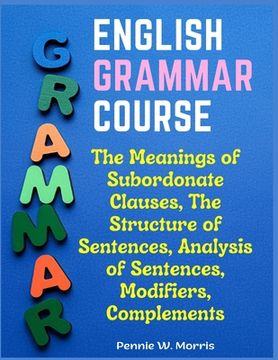Share
English Grammar Course: The Meanings of Subordonate Clauses, The Structure of Sentences, Analysis of Sentences, Modifiers, Complements
Pennie W Morris
(Author)
·
Bookado
· Paperback
English Grammar Course: The Meanings of Subordonate Clauses, The Structure of Sentences, Analysis of Sentences, Modifiers, Complements - Pennie W Morris
Choose the list to add your product or create one New List
✓ Product added successfully to the Wishlist.
Go to My Wishlists
Origin: U.S.A.
(Import costs included in the price)
It will be shipped from our warehouse between
Thursday, June 27 and
Monday, July 15.
You will receive it anywhere in United Kingdom between 1 and 3 business days after shipment.
Synopsis "English Grammar Course: The Meanings of Subordonate Clauses, The Structure of Sentences, Analysis of Sentences, Modifiers, Complements"
Subordinate clauses may be classified not only according to their use as parts of speech, but also, in quite a different way, in accordance with their various meanings. These distinctions in idea are of capital importance for the accurate and forcible expression of thought. Analysis is a Greek word which means "the act of dissolving or breaking up." In grammar it is applied to the separation of a sentence into its constituent parts, or elements. To dissect a sentence in this way is to analyze it. The elements which make up a sentence are: - the simple subject; - the simple predicate; - modifiers; - the complements, direct object, predicate objective, predicate adjective, predicate nominative; - the so-called independent elements, -the interjection, the vocative (or nominative of direct address), the exclamatory nominative, and various parenthetical expressions. In analyzing a simple sentence, we first divide it into the complete subject and the complete predicate. Then we point out the simple subject with its modifiers, and the simple predicate with its modifiers and complement (if there is one). If either the subject or the predicate is compound, we mention the simple subjects or predicates that are joined. The various kinds of modifiers and complements have all been studied in preceding chapters, each in connection with the construction which it illustrates. For purposes of analysis, however, it is necessary to consider modifiers as such and complements as such. Some verbs have a meaning that is complete in itself. Such a verb needs only a subject. When this has been supplied, we have a sentence, for the mere verb, without any additional word or words, is capable of being a predicate.

